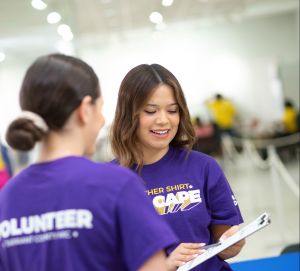Find your fit

Find your fit
There are a number of ways you can be a Local Hero. Read below to find the right fit for you.
Administrative Support
Assist in a variety of functional roles during emergency response:
- Volunteer / staff check-in
- Badging and credentialing
- Other administrative support functions
During non-emergency events, volunteers are utilized to assist with providing:
- Administrative support
- Contact investigations
- Community outreach and education
Volunteers interested in assisting in this capacity should be well organized, detail oriented, able to work under pressure, proficient in the use of a computer / laptop and enjoy working with the public.
Logistics
Assist in a variety of roles during emergency response operations:
- Inventory control
- Records management
- Supply coordination
During non-emergency events, volunteers assist with duties such as:
- Equipment set-up / take down at community events
- Performing routine maintenance on small-engine equipment
Volunteers interested in assisting in this capacity should be able to lift at least 30 pounds, and be able to bend, stoop, climb and reach frequently, as well as stand for extended periods of time.
Medical
Licensed healthcare professionals (i.e., nurses, physicians, pharmacists, veterinarians, etc.) play a key role in emergency response operations and are utilized to staff roles such as:
- Clinic manager
- Patient Screening
- Distributing medications
During non-emergency events, medical volunteers assist with:
- Providing immunizations and basic first aid at non-emergency community events
- Community outreach and education
- Volunteer training
Volunteers interested in assisting in a medical capacity must have a current medical license and be authorized to practice in the state of Texas.
Mental Health
Provide crisis counseling and information and referral services to individuals who have been emotionally impacted as a result of a disaster or emergency. Volunteers interested in assisting in this capacity should have previous counseling (i.e., pastoral, mental health, chemical dependency, etc.) experience.
Radio Operations
Assist with internal and external amateur radio communications during emergency and non-emergency events. Volunteers interested in assisting in this capacity should:
- Have general knowledge of communications systems (i.e., satellite, amateur radio, GMRS, computer systems, etc.)
- Have the ability to communicate effectively
- Current Amateur Radio Operators license is mandatory
Translators / Interpreters
Assist with translating written documents to other languages and / or interpreting information verbally from English to the native language of non-English speaking individuals, or using sign-language for hearing impaired individuals. Volunteers interested in assisting in this capacity should be able to speak, read and / or write fluently in at least two languages, one of which is English.
Call Center Operations
Assist with answering in-coming calls and providing detailed and accurate information to callers in an event requiring call-center activation. Call centers are typically activated when there is an increased public demand for information, such as a disease outbreak, that requires additional phone lines and manpower. Volunteers who are interested in assisting in this capacity should have effective communication skills, the ability to remain calm under pressure, and be able to sit for extended periods of time.
Other
So whether you’re an astronaut, zoologist or anything in between, you can be a local hero by using your skills and talents to assist the residents of Tarrant County. Volunteers are needed to staff a variety of roles during emergency response such as:
- Greeters
- Runners
- Form distribution
- Crowd control
- Traffic control
- Child care
Volunteers are also needed to assist with non-emergency community events such as:
- Back-to-school immunization clinics
- Health fairs
- Disaster exercises and drills
